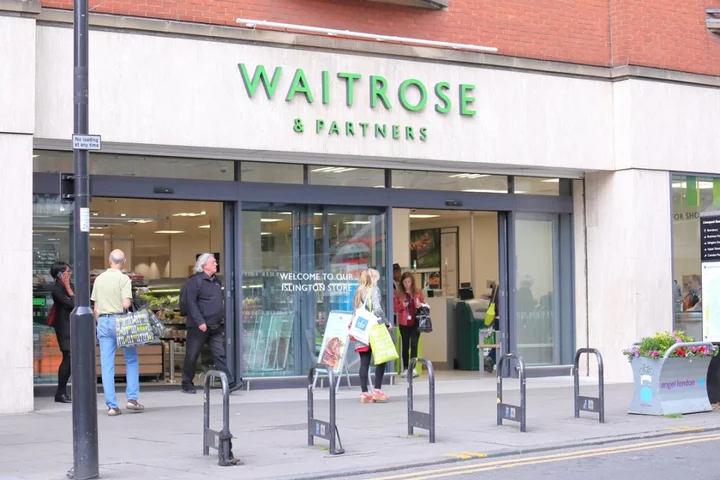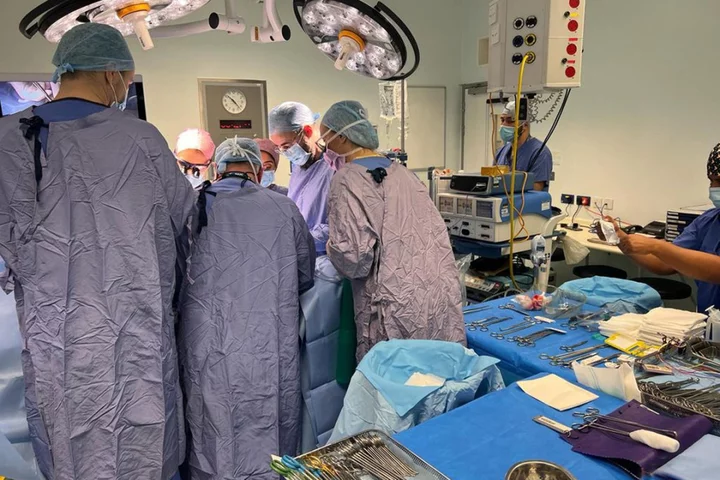
Taking adult education classes may lower risk of dementia, study suggests
Taking an adult education class could help lower your risk of developing dementia, researchers have found. Middle-aged and senior citizens in adult education have a 19% reduced chance of developing the condition within five years, a new study suggests. The findings also suggest that people who took the classes kept up their fluid intelligence – the ability to reason quickly and to think abstractly – and non-verbal reasoning performance better than peers who did not. First author Dr Hikaru Takeuchi, of Tohoku University in Sendai, Japan, said: “Here we show that people who take adult education classes have a lower risk of developing dementia five years later. “Adult education is likewise associated with better preservation of non-verbal reasoning with increasing age.” Here we show that people who take adult education classes have a lower risk of developing dementia five years later Dr Hikaru Takeuchi, Tohoku University Dr Takeuchi and his co-author Dr Ryuta Kawashima, also a professor at the Institute of Development, Ageing and Cancer at the university, analysed data from 282,421 people in the UK Biobank, which holds genetic, health, and medical information from approximately half a million British volunteers, They had enrolled between 2006 and 2010, when they were between 40 and 69, and had been followed up for an average of seven years at the time of the new study. Based on their DNA, people were given an individual predictive risk score for dementia, and self-reported if they took any adult education classes, without specifying the frequency, subject, or academic level. The study looked at data from the enrolment visit and third assessment visit, between 2014 and 2018. Those enrolled in the study were given psychological and cognitive tests, for example for fluid intelligence, visuospatial memory and reaction time. According to the study published in Frontiers in Aging Neuroscience, 1.1% of people in the sample developed dementia over the course of the study. It also found that people who were taking part in adult education, at enrolment had 19% lower risk of developing dementia than participants who did not. The results were similar when people with a history of diabetes, high cholesterol, cardiovascular diseases, cancer or mental illness were excluded. The researchers suggest this means the observed lower risk was not exclusively due to people with developing dementia being prevented from following adult education by symptoms of these known conditions. Dr Kawashima said: “One possibility is that engaging in intellectual activities has positive results on the nervous system, which in turn may prevent dementia. “But ours is an observational longitudinal study, so if a direct causal relationship exists between adult education and a lower risk of dementia, it could be in either direction.” Read More Charity boss speaks out over ‘traumatic’ encounter with royal aide Ukraine war’s heaviest fight rages in east - follow live Indiyah Polack: I didn’t want to go on Love Island because of my acne Everything you need to know about the UK’s first womb transplant Why are wellbeing experts concerned about the ‘lazy girl job’ trend?
1970-01-01 08:00

Tonga media guide
An overview of the media in Tonga, including links to broadcasters and newspapers.
1970-01-01 08:00

Tonga country profile
Provides an overview of Tonga, including key dates and facts about this Pacific island nation.
1970-01-01 08:00

Waitrose has launched its first ever lunchtime meal deal
Waitrose has joined major supermarkets by introducing its first lunchtime meal deal. The upmarket retailer has said that on 30 August, it will be introducing its Food To Go offer, which will include a main, side and drink for £5, due to the growing demand for easy lunches as workers return to the office following the end of the pandemic. The deal will include a range of sandwiches, wraps, sushi and salads, alongside fruit, cereal bars, juices and smoothies. Waitrose has long offered all these products as part of its Food To Go range, but this is the first time they will be available in a lunchtime deal. Waitrose joins other supermarket chains including Sainsbury’s, Tesco, Morrisons and also Boots, which all offer lunch deals – but Waitrose’s deal is the most expensive, with Tesco’s deal costing £3.90 and Sainsbury’s and Morrisons’s equivalents costing £3.50. Meanwhile, a Boots meal deal costs £3.99 but it is £3.60 if you use an Advantage Card. MyWaitrose customers who bring in their own cup can also get a free cup of coffee when they buy their £5 meal deal. The supermarket has launched its first vegan BLT sandwich, and have also included chilled snacks such as Taiko gyoza and Higgidy ham hock & cheddar rolls in the deal. Speaking about the new launch, Waitrose Food To Go buyer Jennifer Moscardini said: “We know lots of our customers are heading into our shops to grab something for their lunch, so to be able to offer them a convenient, high-quality and great value meal deal is really important for us.” It follows reports that Waitrose and John Lewis will start offering free hot drinks and discounted food to on-duty police officers in an attempt to tackle shoplifting. The upmarket shops hope uniformed police and patrol cars being on site will deter thieves in a similar way to which motorists slow down on the roads when they see officers. John Lewis Partnership, which owns the brands, has written to the Police Federation to say officers can get free coffee if they bring a reusable cup. Community support officers will also be able to take advantage of the initiative, which John Lewis has named “thanks a latte”. Read More Prince Harry and Meghan Markle sightseeing tour led by Thomas Markle’s friend sparks outrage over privacy Bride tries on mother’s wedding dress 30 years after parents’ wedding Former royal chef explains why Prince William and Kate’s children don’t eat with them
1970-01-01 08:00

Uzbekistan country profile
Provides an overview of Uzbekistan, including key events and facts about this central Asian country.
1970-01-01 08:00

Everything you need to know about the UK’s first womb transplant
The UK’s first womb transplant means that, in future, dozens of women born without a functioning organ can carry babies of their own. – What has happened? Surgeons have performed the UK’s first womb transplant on a 34-year-old woman whose older sister donated the organ to her. In a complex procedure, the medical team removed the womb from the 40-year-old woman and implanted it directly into her sister. Both women have made a good recovery. – Have any babies been born? Not yet. Experts want to be sure the transplant is stable and the womb is functioning fully before the younger woman undergoes IVF. She has stored eight embryos and will have fertility treatment later this year in central London. The woman hopes to have more than one baby. Once she has completed her family, the womb will be removed to prevent her needing immunosuppressant drugs for the rest of her life. – Has the NHS paid for the operation? No. Each womb transplant costs around £25,000 and is fully funded by the charity Womb Transplant UK. This includes payment to the NHS for theatre time and the patient’s stay on a ward. The operations are only carried out at times when the NHS is not using the operating theatre, so they do not impact on usual NHS waiting lists. Surgeons and medical staff involved in the transplant have not been paid for the operation and have given their time freely. – Have other womb transplants been carried out around the world? More than 90 womb transplants have been carried out internationally, with most operations involving a living donor. The first successful womb transplant took place in Sweden in 2014, with the baby – Vincent – born to a 36-year-old woman who described him as “perfect”. In 2000, a transplant was performed on a 26-year-old woman in Saudi Arabia but the donor womb survived for only 99 days due to problems with its blood supply. To date, womb transplants have been carried out in more than 10 countries, including Saudi Arabia, Turkey, Sweden, the US, China, Czech Republic, Brazil, Germany, Serbia and India. – How successful is the operation? Data from the US shows that more than half of women who received a womb through a transplant in the US went on to have successful pregnancies. Between 2016 and 2021, 33 women received womb transplants in the US and, as of last summer, 19 of them (58%) had delivered a total of 21 babies. In 74% of those receiving a womb, the organ was still functioning one year after transplant and 83% of this group had live-born children. – Will there be more transplants in the UK? Yes. The second British womb transplant is scheduled to take place this autumn and experts believe a maximum of 20 to 30 per year could be carried out in the UK in the future. Transplants could help women born without a functioning womb and those who lose their organ to cancer or other conditions. Estimates suggest there are 15,000 women in the UK of childbearing age who do not have a functioning womb. – Will there be a shortage of donor wombs? Womb Transplant UK is running two programmes, one involving living donors and another with organs from people who have died. The living donor programme in the UK has so far focused on women with relatives who are willing to give their wombs. However, the team believes that in the future, the living donor programme will expand to include friends or altruistic living donors. This is currently more common in the US. The use of deceased donors is assessed by the team on a case-by-case basis. Read More Charity boss speaks out over ‘traumatic’ encounter with royal aide Ukraine war’s heaviest fight rages in east - follow live Why are wellbeing experts concerned about the ‘lazy girl job’ trend? How to check for cancer, as Morrisons puts NHS cancer advice in underwear labels Prostate screening ‘could save lives’ – the symptoms and risk factors you need to know
1970-01-01 08:00

India counts down to crucial moon landing
MUMBAI India will make its second attempt to land on the moon on Wednesday, a mission seen as
1970-01-01 08:00

Heavy flooding near Grand Canyon's southern rim prompts calls to shelter in place. Swift water rescue teams are on scene
Heavy flooding just south of the entrance to Grand Canyon National Park prompted calls to shelter in place at the popular Arizona tourist destination Tuesday as swift water rescue crews responded to the area.
1970-01-01 08:00

Andrew Tate prosecution files reveal graphic claims of coercion ahead of trial
Romanian prosecutors' files, seen by BBC, allegedly show the influencer coercing women into sex acts.
1970-01-01 08:00

Zimbabwe election: Voters head to the polls with inflation on their minds
Robert Mugabe's successor faces his main challenge from Nelson Chamisa of the opposition CCC.
1970-01-01 08:00

UK-India trade talks enter 'final, trickier' stage - government sources
A deal could be struck within months - but sources say difficult areas of negotiation remain.
1970-01-01 08:00

Three reasons why Trump's arrest in Georgia may be different
When he turns himself in at Fulton County Jail, the process won't be the same as his last three arrests.
1970-01-01 08:00
